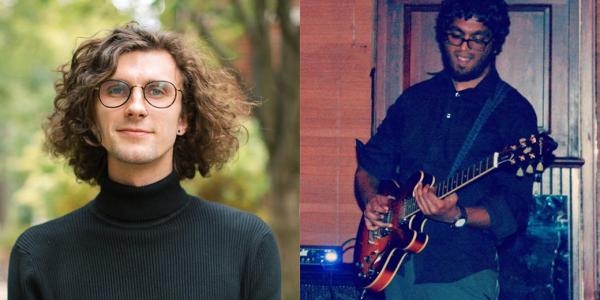Department of Music Lecture: Jacob P. Cupps & Varun Chandrasekhar
Jacob P. Cupps, PhD student in music theory, Washington University in St. Louis
Title
“‘If You’re Seeking Understanding…’: Glissant’s Opacity, ELUCID’s I Told Bessie, and the Politics of Legibility in Contemporary Underground Hip-Hop”
Abstract
Spotify’s Carl Chery claims that, in the streaming era, the designation “underground rap” has lost its meaning because all rappers share the same space on the internet (Gee 2021). This presentation, by contrast, reframes undergroundness as a set of social behaviors that operate in opposition to Chery’s notion of boundaryless listening. Cupps argues that mainstream hip-hop culture enacts a “liberal mandate of legibility” (Momii 2021) that underground hip-hop disrupts by communally centering what Édouard Glissant refers to as opacity—or “that which cannot be reduced” through Western interpretations of the racialized Other (1997). This talk uses two fan responses to the Brooklyn-based underground rapper ELUCID’s album I Told Bessie (2022) to demonstrate the difference between modes of interpretation in mainstream and underground communities: (1) Professor Skye’s YouTube review, which attempts to render ELUCID legible as an emcee who “makes emotional sense [but not] sense sense,” thereby reducing the album to a commentary on Blackness in America, and (2) Joseph Rathgeber’s zine about I Told Bessie, which reinforces the album’s opacity through associative, multilayered commentary on it.
Biography
Jacob P. Cupps researches music production and subgenre formation in rap, examining the means by which hip-hop musicians create and communicate identities in sound. In particular, Jacob is developing several projects centered around musicians associated with the Ruby Yacht collective, as well as the independent rap labels Backwoodz Studioz and Mello Music Group.
Varun Chandrasekhar, PhD student in music theory, Washington University in St. Louis
Title
“Clownin’ in Blue: Mingus and the Jazz Absurd”
Abstract
This talk provides a close reading of Mingus’s “The Clown” to demonstrate how the piece, through its numerous a-typicalities (its orchestration, the voice-over, its free improvisation) recasts jazz as an absurdist art form. The interpretation combines theories from Esslin’s (2001) conception of the “theater of the absurd,” Bhaktin’s (2009) historicization of the clown, and Fanon’s (2008) existential psychoanalysis of the white gaze as a means to understanding the piece. Varun argues that Mingus, within Baraka’s (1999) paradigm of jazz, forces the listener to notice the absurd debasement of an African-American art form. In absurdist terms, Mingus’s idiosyncrasies reject the normative expectations that a jazz listener would use to approach the tune. Thus, within the existential paradigm, these quasi ”fourth-wall” breaks reveal Mingus’s personal critique of the corporatized cooption of jazz in a manner that galvanizes the audience.
Biography
Varun Chandrasekhar's research, building on his experience as a guitarist, focuses on the existential condition of the jazz musician. Varun examines how the complex, racially marked, urban reality of the jazz musician can guide our understanding of the music, how the fact that the jazz musician is thrown into the world influences our musical intuitions, and whether these properties are then theoretically quantifiable.

